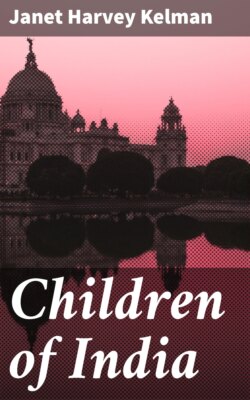Читать книгу Children of India - Janet Harvey Kelman - Страница 8
На сайте Литреса книга снята с продажи.
CHAPTER VI
THE STORY OF THE PROPHET
ОглавлениеTable of Contents
There are hundreds of other old stories that affect the life of Indian children to-day; but if we remember those which tell us of the holy land—the seats of the gods—amongst the Himalayas; of the sacred river of the Ganges, whose waters are even said to flow underground to feed the other rivers of the land; of what life and death, fate and caste mean to the Hindus, we shall have something to guide us.
But all those who live in India are not Hindus. Once, long ago there was an Arabian named Mohammed. He was a camel-driver in Mecca, but from his early childhood he used to dream strange dreams in which he had visions of angels who came to speak with him. He had a faithful disciple, and he used to tell him what he had heard in his dreams. This man thought the things Mohammed told him were very wonderful, and he wrote them down. He had not books in which he could write them, so he took oyster-shells and bits of wood and stone, and sometimes even the shoulder bone of a sheep, instead of paper, and wrote the teachings of Mohammed on them. Mohammed believed that there was only one God, whom he called “Allah,” and he said that he was his prophet. Within his life-time he conquered Syria, Egypt and Persia, and before fifty years had passed after his death his followers had marched through the wild passes of the mountains into India. Since then, there have been many followers of the faith of the prophet there, and whenever they have been strong and powerful they have fought against image worship; indeed one of their great leaders was called the idol-smasher.
The followers of Mohammed believe in fate as firmly as the Hindus do, but in other religious things they differ from them greatly. Their greatest feast day is at the end of the month that they call Ramadan. During the whole month they hold a fast, and eat only after the sun sets. Then on the last night of Ramadan they rejoice not only because the long fast will so soon be broken, but also because it is the night on which they believe their sacred book, the Koran, came down from heaven. But the Koran was really gathered after the prophet’s death from the sentences his disciple had written down on the stones and oyster-shells and other odds and ends.
On the morning after this night of gladness all the Mohammedan men and boys gather to the Mosques to praise Allah for the good that they have enjoyed through the past year, and to ask for mercy in the coming one. But sometimes there is not room within the mosque of the city for all who gather to worship, and then those who cannot get into it spread their prayer rugs on the ground under the open sky. Everyone is in good spirits and the beggars know it, and squat on the roadsides ready to call out to every passer-by for gifts. The followers of the prophet are prepared for this and they scatter bread and rice and beans, and handfuls of shells here and there, while the beggars shout and scramble to get as much as they can.
Whenever the service in the Mosque is over, everyone rushes to the shops, where all kinds of Indian foods can be had, for all are hungry and happy. The scene is like a great fair with picnic parties everywhere, only there are no women to be seen. There are old men, and tiny boys; there are farm-servants and wealthy land-owners, but never a lady nor a girl. All day long while the feasting goes on the streets are gay with flowers and banners, and at night fireworks flash out against the dark sky.
It is only once a year that this great feast takes place, but every day the followers of the prophet can be seen at prayer. A call sounds out from the roof of each Mosque, and the Mohammedan when he hears it spreads his rug on the ground by the roadside or in the open field, kneels on it with his face towards Mecca, his holy city, and prays to Allah. When his prayer is done he begins again at his work where he left off, but while the prayer lasts he seems to know nothing, and to see nothing of what is around him, but to think only of Allah and his prayer to him.
